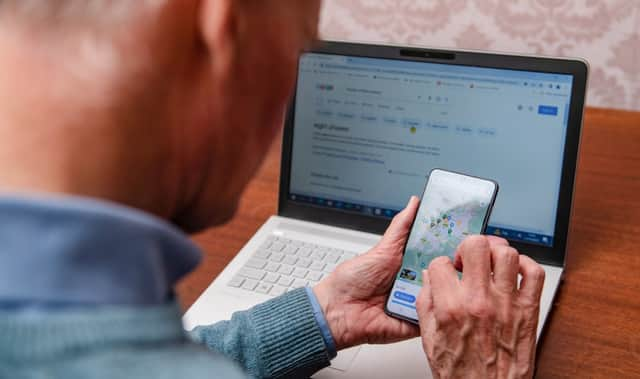Older generations are becoming more tech-savvy to stay connected to loved ones


A poll of more than 850 adults aged 70 and above found 43 per cent have recently reconnected with old school friends online.
While 32 per cent have taken to online gaming, 35 per cent also enjoy seeing what their grandchildren get up to on Instagram - and one in three regularly video call their friends and family members.
Advertisement
Hide AdAdvertisement
Hide AdHowever, 79 per cent feel there is an outdated stigma that older people are unable – or don’t want to – use digital technology.
In fact, 49 per cent of this demographic are keen to learn more about being online, while 78 per cent also use a tech device or the internet at least a few times a week to combat loneliness.
The research was commissioned by Specsavers Home Visit Service, which has teamed up with the Royal Voluntary Service to demonstrate how the digital world is helping to tackle loneliness among the older generation.
Sam Ward OBE, deputy CEO at Royal Voluntary Service, said: “Being online is not just a convenience, it's a vital way for people to stay connected, informed, and engaged and as people get older, this becomes even more important.
Advertisement
Hide AdAdvertisement
Hide Ad“After successfully getting more people online during the pandemic through our Virtual Village Hall activity hub and community, we realised its value to people who want to feel connected.
“And as our research shows, the internet can give us great access to connect with friends, family and also forge new connections improving both health and wellbeing.”


Combatting loneliness
The study also found 32 per cent of over 70s feel there aren't enough opportunities in their local community to meet and connect with new people of the same age. But just under a quarter consider it extremely important to learn new skills as they get older.
On average, those over 70 have learned at least four new skills each since hitting the milestone age.
Advertisement
Hide AdAdvertisement
Hide AdThere is also an eagerness to learn new online skills, including internet banking (25 per cent) and participating in virtual classrooms (17 per cent).
While 15 per cent are hoping to learn mindfulness and meditation, others are keen to improve their baking (17 per cent) and arts and crafts skills (12 per cent).
It also emerged 44 per cent of those who took part in the study, via OnePoll.com, would consider learning a new skill to combat loneliness. However, 27 per cent believe there aren’t enough free online classes available to them.
For those over 70 who can’t leave their homes without help due to a physical or mental health condition, this becomes even more important with 61 per cent wanting to learn a new skill to combat loneliness.
Advertisement
Hide AdAdvertisement
Hide AdDawn Roberts, clinical director for Specsavers Home Visits, which offers eye tests in homes of people who are unable to leave due an illness or disability, said: “We want to do as much as we can to improve the daily lives of our customers, beyond helping them with their vision.
“The home visits allow vulnerable customers, who are unable to leave their homes due to age or physical or mental illness, to engage in social contact and reduce feelings of isolation.
“We want to go the extra mile by ensuring they have the means to stay connected with loved ones, meet new people, and gain new skills that interest them.
“We are so excited to be partnering with the Royal Voluntary Service which is already making a huge difference to the lives of its members.”
Comment Guidelines
National World encourages reader discussion on our stories. User feedback, insights and back-and-forth exchanges add a rich layer of context to reporting. Please review our Community Guidelines before commenting.